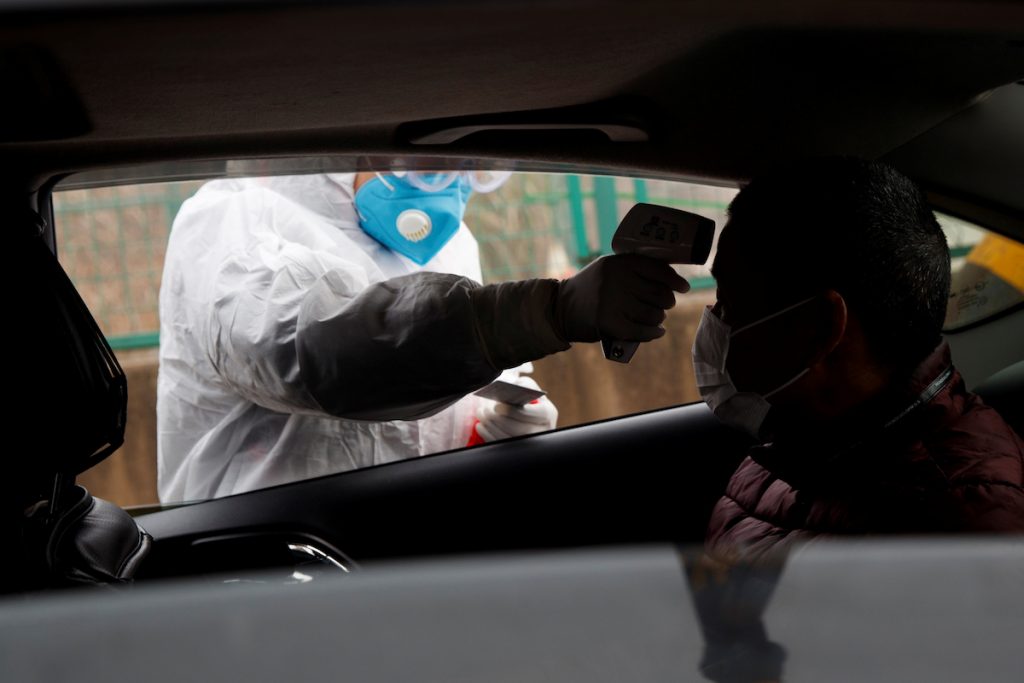
China shut down a city of 13 million people on Thursday in a bid to extinguish a tiny COVID-19 outbreak and chase its zero-case goal, as other nations around the globe battled huge infection surges driven by Omicron.
Stock markets rose in Asia, following Wall Street’s lead, partly due to preliminary studies from Britain indicating Omicron infections were less likely to result in hospitalization compared with the Delta strain.
The cautious optimism was also lifted by news that the US Food and Drug Administration had authorized Pfizer’s anti-COVID pill, providing fresh tools to battle the disease.
But with Omicron driving record infection numbers in many countries, authorities around the world were reimposing restrictions on travel and gatherings.
Europe is enduring the biggest infection caseload, recording 60 percent of the global total over the past week, according to a report compiled by AFP from official sources on Wednesday.
“We have to be more careful than ever in this period,” Belgian Prime Minister Alexander De Croo said, with an impending wave threatening to overwhelm the country’s already burned out healthcare workers.
On Thursday, China locked down the northern city of Xi’an — home to the world-famous Terracotta Warriors –- recalling the sequestering of the central city of Wuhan in January 2020 when the virus first emerged.
Omicron has not been reported in Xi’an and only dozens of the less infectious Delta cases have been detected in the city of 13 million people in recent days.
But the Chinese government, scrambling to maintain its zero-Covid strategy ahead of the Winter Olympics, reacted with typical forcefulness and ordered all residents to stay indoors.
Only one person per household can leave home every two days to buy necessities, while non-essential businesses are closed.
“I think it is necessary to have the lockdown,” a Xi’an resident, who wanted to be identified only as Yuan, told AFP.
“It is a countermeasure which we should do as early as possible, it’s really an effective way.”
February’s Olympics are set to be the most restrictive mass sporting event since the pandemic began, with international spectators banned and all participants required to stay inside a closed-loop system.
In addition to mandatory vaccinations before landing in China, all athletes and personnel inside the bubble must undergo daily virus testing and health monitoring.
Symptomatic athletes will be sent to designated hospitals, while any who test positive for the virus will not be able to participate in the Games, officials said.
China has recorded fewer than 5,000 Covid deaths throughout the pandemic, compared with more than 800,000 in the United States.

‘Qualified good news’
In the United States, Pfizer’s anti-COVID pill for high-risk people aged 12 and up was approved on Wednesday.
Pills that are available at pharmacies are likely to be much easier to access than synthetic antibody treatments, which require infusions administered by drip at hospitals or specialised centres.
The United States has spent US$5.3 billion procuring 10 million courses of the treatment, according to the White House.
The European Union’s drug regulator last week also allowed member states to use Pfizer’s Covid treatment ahead of formal approval as an emergency measure to curb a wave fuelled by Omicron.
While better able to bypass prior immunity, Omicron is also less likely to result in hospitalisation compared with Delta, according to the research from Britain published Wednesday.
The preliminary studies — one from Scotland and the other from England — were cautiously welcomed by experts, who nonetheless stressed that any advantage in milder outcomes could still be negated by the new strain’s heightened infectiousness, which may still lead to more overall severe cases.
“We’re saying that this is qualified good news,” said Jim McMenamin, a co-author of the Scottish research.
But healthcare workers in Europe say there hasn’t been much of a reprieve as they struggle to cope with a constant stream of patients, many of whom need intensive care.
Doctors and nurses are in a state of “extreme exhaustion,” said Martial Moonen, head of the infectious diseases service at the public hospital in Belgium’s Liege.
Several of the country’s virologists and epidemiologists say they expect a fifth COVID wave to strike within days, but Moonen said, “we are still going to try to make sure everyone gets their Christmas holidays.”
Source: Licas Philippines
0 Comments